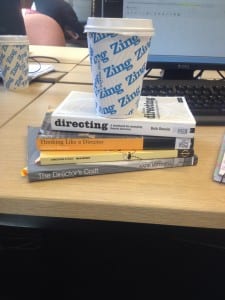During the process of devising the content for Birds Eye View Theatre’s debut show, the three directors, Charlotte, Ellie and I have taken very different approaches when leading our sessions. Having little knowledge in the field of directing, I feel we have developed three very distinct styles as the rehearsals have progressed. Here are three tips I found most useful when directing our company…
In Chapter Two of Directing: A Handbook for emerging theatre directors, author Rob Swain writes;
‘It is important for any director to have what many directors call their toolkit. This Toolkit may include individual games or exercises and it may include whole patterns of structuring rehearsals.’ (Swain, 2011, p.47)
This is true. There are certain warm ups now which have become a regular occurrence of my sessions. I found it is extremely important to motivate the group and by starting the session with a fun and energetic warm up that the group enjoys.
This brings my to my next point regarding ‘Rehearsal Decorum’. If you can establish a professional and comfortable working relationship in your rehearsal space, you are far more likely to see the best work from your actors, administrators and producer. Michael Bloom’s Thinking Like a Director suggests,
The most consistently effective [directors] are those that regard actors with respect, tact and appreciation, as colleagues and members of a team. (Bloom, 2001, p.132).
A final thing I have found most useful during this module is organisational skills. I feel my organisation skills have developed considerably since the beginning of the module. In order to gain authority and respect from the company a director must inform actors and plan rehearsals accordingly. Writer of Directing a Play, Michael McCaffery states his views on the guidelines of ‘daily rehearsals’,
With ‘daily’ rehearsals make sure that:
- you are rehearsing what needs it, not just repeating things.
- you plan far enough in advance to let the actors know where they will be rehearsing and when.
- you do not go out of sequence unless you are confident enough to do so. (McCaffery, p.44, 1988).
I’d like to conclude this post with a rule of my own…
Be confident.
During our process so far at Birds Eye View Theatre I have found confidence is key. Afterall,
‘The director of a play, film or television programme is the person who decides how it will appear on stage… and who tells the actors and technical staff what to do.’ (Sinclair, 1995, p.463).
Work Cited:
Bloom, M (2001) Thinking Like a Director: A Practical Handbook. New York: Faber and Faber.
McCaffery, M. (1988) Directing A Play. London: Phaidon Press Limited.
Sinclair, Gwyneth Fox, Stephen Bullon, Elizabeth Manning. (eds.) (1995) Collins Cobuild: English Dictionary. London: HarperCollins Publishers.
Swain, R (2005) Directing: A handbook for emerging theatre directors. London: Methuen Drama.
